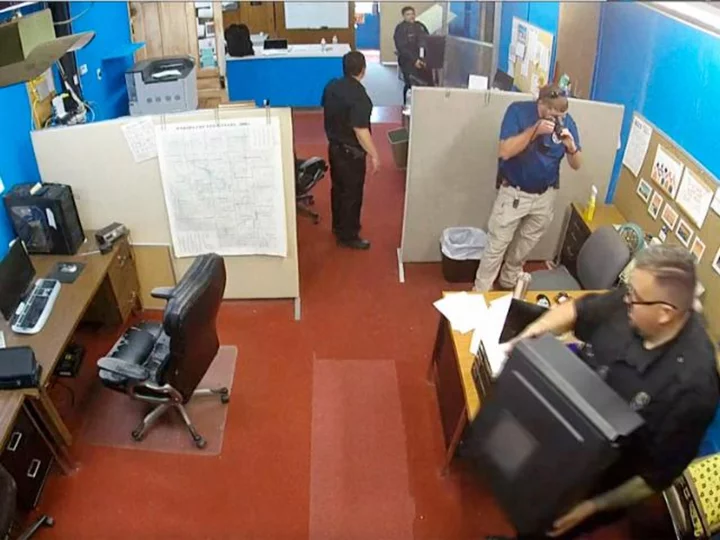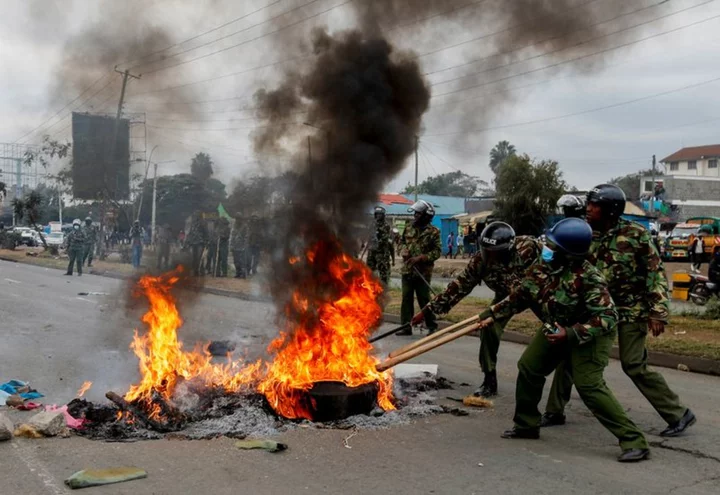The Marion, Kansas, police chief has been suspended after the police raid of a local newspaper and the home of the paper's publisher last month.
Officers in August searched the office of the Marion County Record, as well as the home of the paper's publisher and a county councilwoman, seizing reporters' cell phones and computers, among other items. The move drew widespread condemnation from news organizations and press freedom advocates.
Marion Police Department Chief Gideon Cody at the time suggested the raids were based on the belief that a reporter unlawfully obtained the driving records of a local restaurant owner before the paper published a story about her, according to unredacted affidavits obtained by CNN.
But less than a week after the raids, Marion County's top prosecutor Joel Ensey withdrew the search warrants and asked authorities to return the seized materials, saying "insufficient evidence exists to establish a legally sufficient nexus between this alleged crime and the places searched and the items seized."
Marion Mayor David Mayfield confirmed Cody's suspension to CNN Saturday, but declined to provide further details.
"I did indeed suspend chief Cody and I won't discuss any details regarding his suspension as it is a personnel matter," Mayfield said in an email.
CNN has reached out to The Marion Police Department and the Kansas Peace Officers Association for comment.
The now-suspended police chief is also at the center of a federal lawsuit filed by Marion County Record reporter Debbie Gruver, who accuses Cody of violating her constitutional rights by obtaining an "unreasonable and unlawful" search warrant and seizing her personal property, according to the complaint.
The suit alleges Cody targeted Gruver because he knew she had been investigating allegations of misconduct against the chief during his time working for the Kansas City Police Department, although the newspaper has not published those allegations.
"Such acts were done by Chief Cody in retaliation for Ms. Gruver exercising her protected rights under the First Amendment of the United States Constitution as a reporter for the Record, which protects freedom of speech and freedom of the press," the lawsuit states.
In addition to having her computer seized, Gruver says Cody physically seized her personal cell phone from her, which the suit argues did not fall under the scope of the warrant.
By seizing the personal cell phone, the suit states, Cody violated Gruver's Fourth Amendment right to protection from unreasonable search or seizure.
Cody at the time did not respond to requests for comment from CNN.
Shortly after the raid gained national attention, the police department posted on August 12 on Facebook, "As much as I would like to give everyone details on a criminal investigation I cannot. I believe when the rest of the story is available to the public, the judicial system that is being questioned will be vindicated."
The department declined further comment on the search, referring questions to the Kansas Bureau of Investigation.
It's not just the police chief who has faced backlash over the raids. Judge Laura Viar, who signed off on a search warrant authorizing the searches, is facing a complaint about her decision and has been asked by a judicial body to respond, records shared with CNN by the complainant show.
The complaint requests the Kansas Commission on Judicial Conduct to review "Viar's mental capacity in her decision to seemingly circumvent federal and state law" when she signed off on the search warrant for the newspaper office, according to a copy of the complaint provided by Strahler.
The Kansas Bureau of Investigation is now the lead law enforcement agency looking into the incidents in which police raided the Meyer's office and the home, the bureau previously told CNN.









